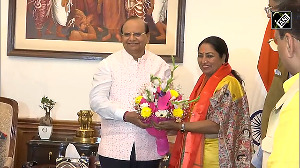Broker Motilal Oswal is always quick to spot an opportunity. That's why he's hooking up all his systems at Motilal Oswal Securities and getting ready to take a plunge into commodities trading.
By month end, the broking firm will offer futures trading in commodities in 200 centres around the country. Oswal isn't expecting overnight returns but he's ready to wait.
"There is a huge potential for the market to grow, but it will take time," he says.
Trading is picking up swiftly at the four new exchanges.
NCDEX's daily turnover has crossed Rs 100 crore (Rs billion) and by the end of this year it expects it to cross Rs 1,000 crore (Rs 10 billion) daily.
Motilal Oswal Securities will offer futures trading in commodities in 200 centres.
Online broking site Sharekhan has taken memberships of the Mumbai-based MCX and the NCDEX.
He isn't the only one making a giant move into a new business. Online broking site Sharekhan has also jumped into the fray. It has taken memberships of the Mumbai-based Multi Commodity Exchange (MCX) and the NCDEX (National Commodity & Derivatives Exchange).
Also, Sharekhan is setting up a dedicated research department for commodities and is developing an exclusive microsite for commodities trading. Less than 5 per cent of Sharekhan's 40,000 customers trade in commodities but the company is confident that this will climb quickly.
"We can offer our equity clients one more avenue of investment and further diversification of risk on their portfolios," says S I Kannan, manager, commodity derivatives.
Last year the government ended a 40-year ban and gave the green signal for commodities trading. The result has been the opening of four commodities trading exchanges in quick succession.
In November, trading began at MCX and that was followed by NCDEX in December. That was followed by the opening of the NMCE (National Multi Commodity Exchange) in Ahmedabad and the NBoT (National Board of Trade) based in Indore.
Indians haven't had much experience with commodities trading. But everyone knows it's probably a good idea. NCDEX has already received 550 applications for memberships and 180 of these have already been enabled.
The result is that business is picking up swiftly at the four exchanges. NCDEX's daily turnover has crossed Rs 100 crore (Rs 1 billion) and by the end of this year P H Ravikumar, managing director and chief executive officer of NCDEX expects it to cross Rs 1,000 crore (Rs 10 billion) daily.
MCX says trading will pick up even faster and will touch Rs 1,000 crore (Rs 10 billion) long before December. The exchange has made important strategic alliances with key organisations like the Bombay Bullion Association. MCX's turnover has already gone above Rs 100 crore (Rs 1 billion).
Inevitably, all the new exchanges are still feeling their way forward. NCDEX is trading in a range of six commodities including gold, silver, cotton and soya. What's more, it will soon offer trading in jute, rubber and pepper.
Similarly, MCX is trading in gold, silver, castor seed, pepper, cotton, soya oil, palm oil and rubber. Nevertheless, MCX gets most of its volumes from precious metals like gold and silver.
Motilal Oswal too says his firm will start by offering precious metals to customers. Says Oswal: "To begin with we will offer trading in bullion because we feel most customers will be able to understand those products."
Each of the exchanges has its own strong points. Indore-based NBoT, for instance, is strong in soya which is grown in the region and NMCE is strong in cotton.
Each exchange is also reaching outside its region with the help of technology. MCX, for instance, offers screen-based trading through VSAT as well as the Internet, while NCDEX currently works through VSAT.
Once broking houses like Sharekhan and Motilal Oswal get more seriously into the business the exchanges should be able to stretch across the country. For instance, Motilal Oswal says 50 out of its 150 franchisees have shown interest in commodities trading.
Other equity broking houses are also following suit. This is despite the fact that the margins on comodity futures are far lower than trading in equity markets.
Experts reckon that margins on commodities range from anywhere between 5 per cent and 12 per cent depending on the nature of the commodity. The margins are usually higher in bullion and lower for oils and other commoditites like grain.
For old-timers in the commodities business the exchanges have come as a boon. Take Prithiviraj Kothari, director of Mumbai-based Riddhisiddhi Commodity Brokers.
For Kothari trading in gold bullion is no longer a gamble after 20 years in the business. Now that the exchanges have come into place, he doesn't have to hold stocks of gold, waiting for prices to go up or down before taking a call on whether to sell or buy.
Similarly, look at Sushant Gandhi, director of Mumbai-based Rushabdev Commodities. Adding futures contracts to his spot trading business, has made life much easier for this small-time edible oils and oil seeds trader.
"Earlier all the trading was verbal, you didn't know whether the price you were being offered was the right one or not. The exchange now offers a forum for price discovery and acts as an insurance to the spot market," he says.
Gandhi started trading in the futures commodity market in November. About 65 per cent of trading is conducted by commodities companies.
What's the biggest task ahead for these exchanges? One is to ensure that they keep a high profile so that investors start looking at commodities as a viable option.
MCX, for instance, has been advertising regularly. And NCDEX and MCX are both holding education sessions for brokers. MCX is also tying up with smaller exchanges like the Bombay Bullion Association.
There are other issues being faced daily. Many old-style brokers aren't comfortable yet with online screen based trading.
As one traditional commodity broker puts it, "Learning the technology is a huge adjustment. We may know what futures trading in commodity is but are still to understand how the technology works."
At another level, the exchanges themselves are coping with tough logistical problems. And as long as the stock market is booming, only a limited number of people are willing to try a hand at commodities.
Says a Mumbai-based broker, "The real shift from equity to commodity trading will occur when the stock markets are down and people look for other avenues of profits."
There is also the issue of liquidity. Currently with low volumes, several players feel there isn't enough liquidity in the market. So for instance, stock brokers like Parag Parikh Financial Services are waiting to see how the situation develops.
Says chief executive officer Nimish Shah, "It's too early to say when we will get into commodity trading but we are interested, and are waiting to see how it develops."
Executives at the exchange aren't worried. Says Ravi Kumar, "It's like derivatives that took a long time to pick up. The same thing will happen here as well."
Adds Jignesh Shah, managing director, MCX: "Considering that commodities form a huge part of the nation's GDP, a lot of people will be interested in trading."
Oswal and others also feel that the real trick will be distribution and marketing because that will ensure more and more people will get into trading.
When that happens, the country will catch up with the rest of the world where the commodity markets are larger in volume terms than equity markets.






 © 2025
© 2025